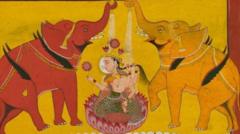**The ongoing diplomatic conflict between Canada and India intensifies following accusations of Indian involvement in the murder of a Canadian Sikh activist, with key diplomatic figures expelled from Canada.**
**Canada and India's Diplomatic Rift Deepens Amid Allegations**

**Canada and India's Diplomatic Rift Deepens Amid Allegations**
**Canada expels Indian diplomats over alleged complicity in assassination as tensions rise.**
On October 18, 2024, Canada issued serious allegations against India's High Commissioner and five other diplomats, accusing them of being part of a conspiracy involving homicide and extortion aimed at silencing critics of the Indian government residing in Canada. In an unprecedented move, these diplomats, who enjoy immunity under international law, were expelled from the country. This action followed the assassination of Hardeep Singh Nijjar, a Sikh cleric and outspoken advocate for the Khalistan movement, which seeks an independent Sikh state, in June 2023.
While Canadian officials have stated that the Indian government orchestrated Nijjar's killing, officials in New Delhi have strenuously denied any involvement, accusing Canada of exploiting the situation for political benefit among its Sikh population. Despite the gravity of the accusations—including murder—Canada's hands are tied regarding legal action against the diplomats due to their diplomatic immunity, a principle of international law that protects representatives of foreign governments from local jurisdiction.
The ongoing rift between Canada and India marks a significant escalation in tensions, particularly given the complex layers of national interest, diaspora politics, and international law that are intertwined in this case. The situation underscores the limitations of diplomatic immunity and raises difficult questions about political accountability on the international stage.
As both nations navigate this diplomatic crisis, the repercussions could extend beyond bilateral relations, affecting broader geopolitical dynamics, particularly concerning issues related to human rights and political freedoms in the context of the Indian diaspora.
While Canadian officials have stated that the Indian government orchestrated Nijjar's killing, officials in New Delhi have strenuously denied any involvement, accusing Canada of exploiting the situation for political benefit among its Sikh population. Despite the gravity of the accusations—including murder—Canada's hands are tied regarding legal action against the diplomats due to their diplomatic immunity, a principle of international law that protects representatives of foreign governments from local jurisdiction.
The ongoing rift between Canada and India marks a significant escalation in tensions, particularly given the complex layers of national interest, diaspora politics, and international law that are intertwined in this case. The situation underscores the limitations of diplomatic immunity and raises difficult questions about political accountability on the international stage.
As both nations navigate this diplomatic crisis, the repercussions could extend beyond bilateral relations, affecting broader geopolitical dynamics, particularly concerning issues related to human rights and political freedoms in the context of the Indian diaspora.























